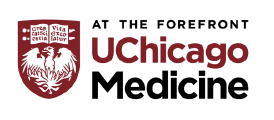University of Chicago Medicine to Participate in Experimental Stroke Drug Study
 The University of Chicago Medicine’s Stroke and Neurocritical Care teams will participate in a global research study to determine if an experimental stroke drug saves lives and brain function by stopping the bleeding in the brains of patients suffering from intracerebral hemorrhage (ICH). The study, “Recombinant Factor VIla (rFVIla) for Acute Hemorrhagic Stroke Administered at Earliest Time," also known as the FASTEST trial, is a multicenter, randomized phase 3 study funded by the National Institutes of Health (NIH).
The University of Chicago Medicine’s Stroke and Neurocritical Care teams will participate in a global research study to determine if an experimental stroke drug saves lives and brain function by stopping the bleeding in the brains of patients suffering from intracerebral hemorrhage (ICH). The study, “Recombinant Factor VIla (rFVIla) for Acute Hemorrhagic Stroke Administered at Earliest Time," also known as the FASTEST trial, is a multicenter, randomized phase 3 study funded by the National Institutes of Health (NIH).
The research will be conducted at the University of Chicago and more than 100 hospitals and mobile stroke units across North America, including Northwestern Memorial Hospital, Central DuPage Hospital in Winfield and Loyola University Medical Center in Maywood.
DuPage Hospital in Winfield and Loyola University Medical Center in Maywood.
“ICH is a common and deadly disease in our community and around the world,” said UChicago Medicine neurologist Christopher Kramer, MD. “Unfortunately, our options for treating these patients are extremely limited, especially early on to prevent growth of the clot and damage to the surrounding brain tissue. FASTEST has the potential to change this.”
All participants will receive the best standard of medical care, including intensive care and close management of their blood pressure. Patients will be randomly selected to receive either the medication recombinant Factor VIIa (rFVIIA) or a placebo that contains no active ingredient.
“Recombinant Factor VIIa is a naturally occurring protein in the body that is crucial to driving the clotting process,” said Kramer. “For this study, some patients will intravenously receive additional rFVIIA protein with the goal of driving forward the clotting process.”
ICH occurs when a diseased blood vessel in the brain ruptures and allows blood to seep into the surrounding tissue. These brain bleeds account for more than 10% of the estimated 17 million strokes worldwide each year. They are the deadliest type of stroke, with a mortality rate of more than 40%, and there is currently no effective treatment for ICH.
“Our hope is that rFVIla, if administered within two hours of an intracerebral hemorrhage, will result in decreased bleeding as compared to placebo and improve outcome,” said Joseph Broderick, MD, a neurologist at the University of Cincinnati and FASTEST principal investigator.
The study will include adults 18 to 80 years old who experience an ICH. Patients who are randomly selected to receive the study medicine will be given it within 120 minutes of the beginning of their stroke.
Because this type of stroke is a life-threatening condition requiring emergency care, some patients may be enrolled without consent if they are unconscious or a family member or other representative is not available. Special government rules allow studies under these unique circumstances to include patients without their informed consent. However, before enrolling the patient, every attempt will be made to locate a family member so that they can decide whether or not they would like the patient to participate in the study.
Related Articles
Citation
. University of Chicago Medicine to Participate in Experimental Stroke Drug Study. Appl Radiol.
July 14, 2021